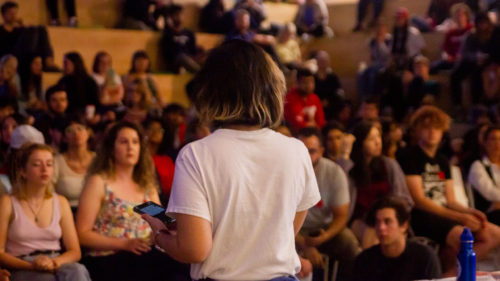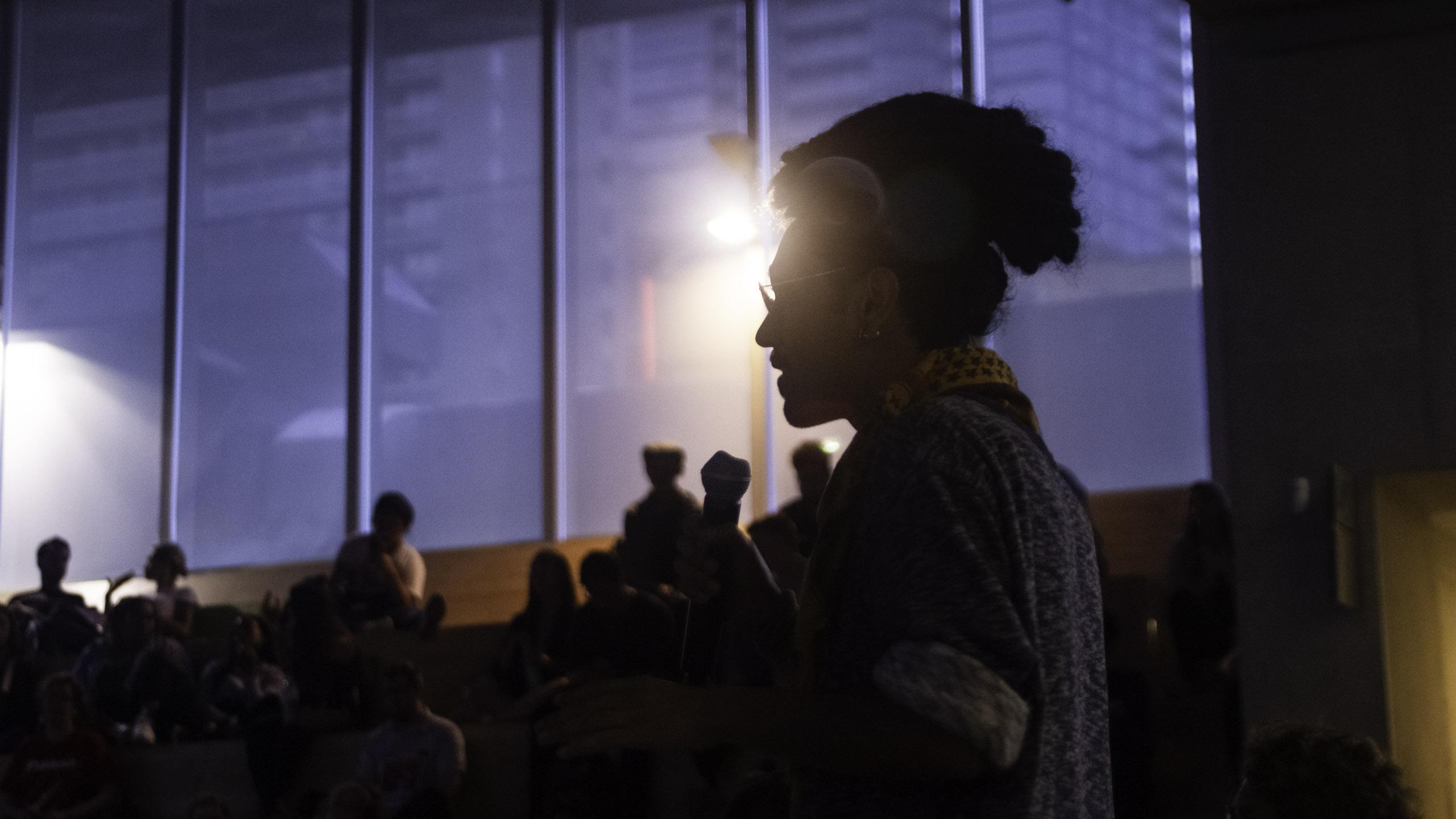By Catherine Abes and Valerie Dittrich
A vote to hold a one-day strike at Ryerson has passed after a general assembly held in the Sheldon and Tracy Levy Student Learning Centre amphitheatre on Sept. 25.
Moved by the Ryerson Student Strike campaign, the one-day strike will be a protest in “opposition to [Ontario Premier] Doug Ford’s cuts to [the Ontario Student Assistance Program (OSAP)].”
“This isn’t just about Doug Ford—it’s about taking back power,” said Olive Pape, outreach organizer on the student strike campaign and member of Socialist Fightback at Ryerson, during her motivation speech. “We have nothing to lose but our loans, and our education to win.”
“We’re making history tonight,” said Hermes Azam, spokesperson for the Ryerson Student Strike and former president of Socialist Fightback at Ryerson. “This is the revival of the student movement in English-speaking Canada.”
The vote comes after hundreds of Ryerson students walked out of class to protest OSAP changes on March 20, making it one of the largest student walkouts in the province. The Eyeopener previously reported on the provincial government’s announcement in January of this year that they would revert the OSAP program back to the 2016-17 framework, then cut the program by $670 million.

Before the vote took place, Azam clarified only Ryerson students were allowed to vote. However, it is unclear who among the attendees were, in fact, Ryerson students.
When asked via email whether there was a system in place to ensure that voters were students, Azam did not respond to The Eyeopener in time for publication.
An overwhelming majority of people in the room voted in favour of the strike, with only one person voting against.
Attendees were given half an hour to share their thoughts on the political aspects of the strike, with Azam redirecting “logistical” questions to organizers. Many spoke to their own personal experiences with OSAP cuts and the larger goal of defeating the Ford government. No individuals spoke in opposition of the strike.
“Many of your profs support you. Many of these profs are appalled by Ford’s cynical policy”
Azam said that while he counted over 200 people in attendance at the beginning of the assembly, “it’s hard to say how many people were there right at the main moment of the strike [vote].”
Campus unions criticized for lack of endorsement
Throughout the general assembly, speakers criticized the absence and lack of endorsement from the Ryerson Students’ Union (RSU) and Continuing Education Students Association at Ryerson (CESAR), leaving ordinary students to organize the strike alone.
“Student unions [are] nowhere to be seen,” Azam said. “The money that we spent on the posters, the money that we spent on all the flyers, all the banners that we put our hours into making, all of that has come out from our pockets.”
“Just imagine how much bigger this general assembly could be if we had the resources and the organizational capacity of our student unions.”
Azam said Ryerson Student Strike organizers had several meetings with both unions, and while some progress was made, the unions eventually “backtracked” on their commitments.
In an email statement, RSU vice-president education Kwaku Agyemang reiterated that the RSU and CESAR, under the We the Students RU (WTSRU) campaign, had already committed to organizing a day of action on Nov. 6 before Ryerson Student Strike asked for endorsement at the first WTSRU planning meeting in August.
At the RSU’s annual general meeting, the union passed a motion to “commit to organizing a school-wide strike against premier Doug Ford’s cuts to education and the Ontario Student Assistance Program.”
Agyemang confirmed that the RSU “had several meetings with the student leaders organizing [the strike] to discuss where the RSU can support the organization and potentially endorse the General Assembly,” with the most recent meeting being Sept. 23.
“However there were a few concerns later on in the process in which we came to the resolution that we could no longer encourage, nor discourage students from participating in the general assembly,” he said.
Accessibility among concerns with general assembly, say unions
Agyemang cited concerns regarding the accessibility of the general assembly that were first raised at the WTSRU meeting in August. The Eyeopener reported that members from both unions were hesitant of making decisions based on only physical meetings, given that some students may not have time to be on campus outside of class or may take all of their classes online.
“Although we don’t necessarily disagree with direct action, we understand that these are big decisions to make on behalf of all Ryerson students,” Agyemang said. “Additionally in order to have the support of all students and work in healthy partnership with all the unions and leaders on campus, we felt a more structured process to engage as many students in consensus was necessary.”
“I’d much rather be a dreamer than have to endure another three more years of this shit”
CESAR president Nicole Brayiannis said that the union is developing a survey to email to their members so that students can decide what action to take on Nov. 6 without having to be physically present on campus.
“We wanted to make sure that we can gather as much support as we can and that we can access as many students as possible, recognizing that at the last walkout that was organized one of the [critiques] was that there wasn’t as much student input as there should have been,” she said.
Agyemang said that the RSU will also hold an online consultation.
Support from faculty
Antoine Panaioti, an assistant philosophy professor at Ryerson, spoke at the GA to express solidarity from faculty. He said that if the strike vote passed, he would head a faculty-led movement to have all classes cancelled on Nov. 6.
“Many of your profs support you,” he said. “Many of these profs are appalled by Ford’s cynical policies.”
Panaioti, who participated in the 2005 and 2012 Quebec student strikes against tuition hikes, also assured the assembly that student strikes and protests work, noting that students have the power to not just roll back OSAP cuts but “play an essential role in bringing Ford down.”
Azam noted that while the cuts are unlikely to be defeated because of a one-day strike, he hopes students will be motivated to escalate their actions—organizing picket lines, marches, longer strikes and connecting with other campuses and the labour movement, for example—until the movement poses a serious threat to the government.
“The fact is students aren’t going to give up,” he said. “This is only going to get bigger, it’s only going to get bolder, it’s only going to escalate from here.
“Some might say we’re dreaming, to be talking about a strike,” said Marco La Grotta, a strike organizer and member of Socialist Fightback Students. “I’d much rather be a dreamer than have to endure another three more years of this shit.”












Leave a Reply